
views
Comprehending Reading Material

Eliminate distractions from your environment. The first step towards improving your reading comprehension has to be reading in a space where you’ll be able to concentrate. Remove any distractions from your environment and turn off electronics to prevent new distractions from appearing. Turn off the TV and any music playing in the room you’re in. If you have a smartphone with you, turn it off or turn it on silent and place it somewhere where notifications that appear on the phone won’t distract you from your reading. If you can’t eliminate all the distractions from your environment, relocate! Move to the library, a study room, or even the bathroom, if that’s where you need to go to have peace and quiet. If you still feel distracted, try listening to classical or ambient music without lyrics.

Read with a helper if you’re reading something above your level. Whether that helper is a teacher, a friend, or a parent, read with someone above your level who you're comfortable talking to and asking questions. They can help you if you have any issues and enable you to talk through the text with someone else. If your helper is an educator, consider having them draw up some key comprehension questions that you can preview before you start reading and that you can aim to be able to answer after you finish. Summarize your reading material to your helper after you finish it and have them ask you questions about the content to test how well you’ve understood it. If you’re unable to answer a question, look back in the book for the answer. If you’re reading a difficult piece of writing, use online resources like Shmoop and Sparknotes to find summaries and comprehension questions.
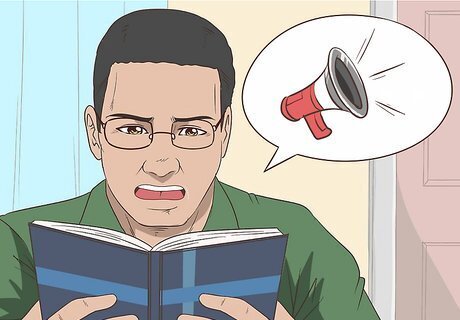
Read aloud. Reading aloud is a great way to slow down while reading and give you more time to process what you're reading, thereby improving comprehension. An added benefit of slow reading is that you get to see the words on the page (visual learning) and hear them spoken aloud (audio learning). If you decide that hearing spoken words helps you improve your comprehension, don't be afraid to get narrated books. Of course, you'll want to read the books in addition to hearing them spoken, but this could greatly improve comprehension. For children struggling with reading comprehension, it’s best to avoid having them read things aloud in front of other people. Instead, just have them read aloud to themselves to avoid stressful or potentially embarrassing situations. Use your finger, a pencil, or a notecard to follow along with the words you read aloud. This way, you stay focused so you can get a better understanding of the reading.
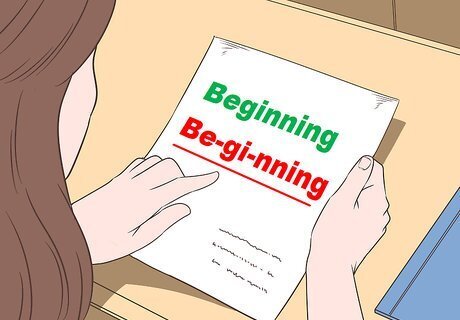
Re-read text as necessary to improve your comprehension. Sometimes when we’re reading, we can read finish a paragraph or page and realize that we don’t remember any of what we just read. This is perfectly normal! When this happens, don’t hesitate to go back and re-read what you’ve just read to refresh your memory and improve your comprehension. If you didn’t understand something the first time around, read a bit more slowly the second time and make sure you understand what you read before moving on. Remember, if you don’t understand or remember what came earlier in a book, you may have a harder time understanding what comes later.
Developing Your Reading Skills
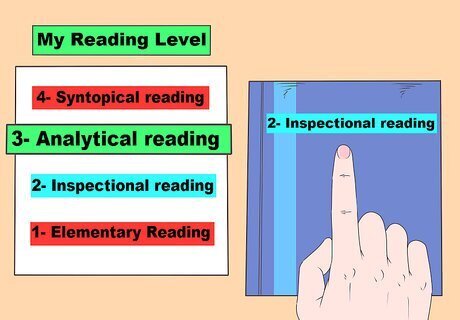
Start with books at or below your level. Your ideal reading level should be one that is comfortable but also slightly challenging. Instead of starting with books that are very difficult, read books you’re comfortable with first and develop a baseline of reading comprehension to build off of. When reading books at your level, you shouldn't be straining to figure out what words mean, or reading sentences over and over again. If you experience this kind of difficulty, you may be reading at a higher level. Use the Oxford Bookworms test or the A2Z Home’s Cool website to determine your reading level. If you're reading for a class and the book you're assigned is above your level, read it as best you can, but continue to read other books at your level. Reading those books will help you understand the harder ones.
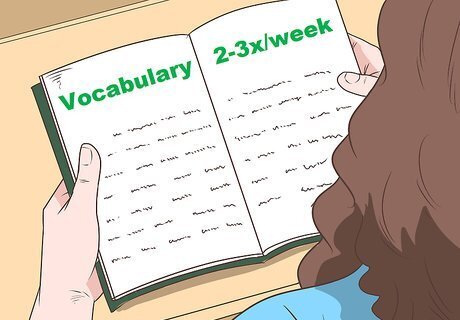
Improve your vocabulary to get better at understanding what you read. If you don't know what a word means, it's going to be hard to improve your reading comprehension. Have a rough idea of what vocabulary level you should be at given your age and work on studying word definitions 2 to 3 times a week. Have a dictionary or computer with you while reading. When you come across a word you don't know, look it up and write the definition down in your notes. It may take longer to read, but that’s okay. Read lots of books. Sometimes the definition of a word will be clear given the context of the sentence. The more you read, the better you'll get at guessing the definition of a word given its context. If you're below your level, start with books that you fully understand and then work your way up. If you’re at the right vocabulary level and want to improve, consider reading books above your level to encounter more advanced words.
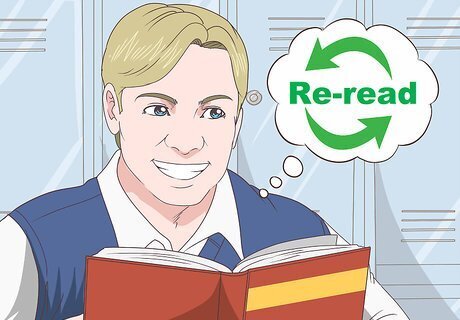
Read books over and over again to gain fluency. Fluency is the ability to read and understand words automatically and at a certain speed. In order to improve fluency, read books twice or even three times to repeat your exposure to various words and phrases.
Taking Notes as You Read
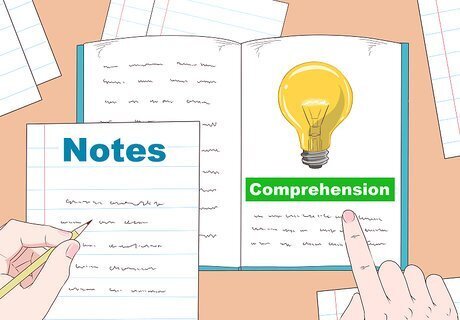
Keep some paper near you to keep notes in. Taking notes, while not immediately exciting, is a good way to boost reading comprehension. If you're reading for a class, try using a notebook. If you're reading for fun, just grab as many pieces of paper as you think you'll need for the story. You’ll want to take notes on paper instead of a laptop or other electronic device, if possible. Physically writing notes has been linked with a deeper and richer understanding of the material under study. If you own the book, take notes in the margins on the side. Jot down what you remember about each chapter, section, or even paragraph. If your reading comprehension is already decent, you may only need to take occasional notes. Don't rewrite the novel. On the other hand, don't write so few notes that you can't follow what was going on chronologically in the story at a given point. Anytime a major event happens, or a new character is introduced, or some odd detail sticks out, write it down in your notes. Keep your notes together so that you can refer to them later. If you jotted down notes on loose-leaf paper, put the paper into a binder, separated by tabs for each different story.

Ask questions about the theme or the author's intentions. Getting in the habit of asking questions will help you improve your comprehension by getting you truly involved in the story. You're trying to figure out what's going on, and in order to do that, you need to ask some questions and pose possible answers. Write down your questions in your notes, as well as your answers. Some hypothetical questions that you might ask yourself while reading a book and taking notes include: Did the main character let the cat out the back door for a reason, or was the author just trying to fill space? Why does the author start the book in a cemetery? Does the setting of the book say anything about the main character right off the bat? What is the real relationship between these two characters? On the face of it, they seem like enemies, but could it be that they actually like one another? Pose these sorts of questions after you finish a section or a chapter and are trying to make sense of the story. Predict what the answer is going to be. When the answer is revealed, ask yourself what supporting details in the book make that explanation the best one for the story.
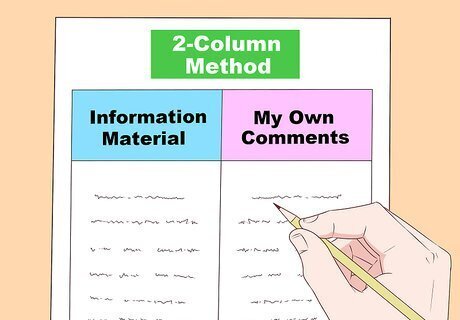
Use the 2-column method when taking notes. A helpful way to organize your notes when reading is to divide your paper into 2 columns. In the left column, write down information and material that comes out of the reading, including page number, summaries, and quotations, and in the right column for your own comments on what you read. You’ll want to include the information in the left column for 2 main reasons: first, if you want to refer back to something you read, you’ll need to know where it was that you read it; and second, you’ll need to include this information in any citations you make. Most of the notes you make in the left column should be summarizing or paraphrasing the main point of what you read. If you write down any direct quotes from the book, make sure to use quotation marks. The notes you make in the right column should reflect how you find what you’re reading to relate to your own ideas or the ideas you’ve been discussing in a class.
Reading with a Purpose
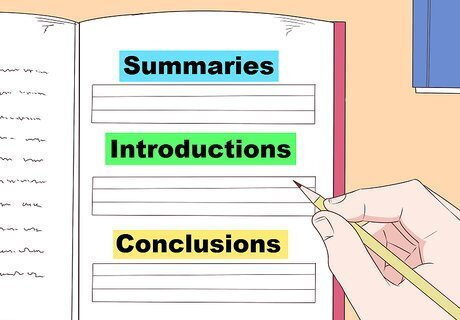
Look at important sections first instead of reading a book linearly. If you are reading factual information, such as a textbook or a newspaper, use the organization of the piece to guide you. Read sections like summaries, introductions, and conclusions first to get a better sense of where important information is. Look for the main idea in each section you read and then “read around” that main idea. It often comes first or very early on in the section. You should use the table of contents, section headings, and titles to determine where to read first.
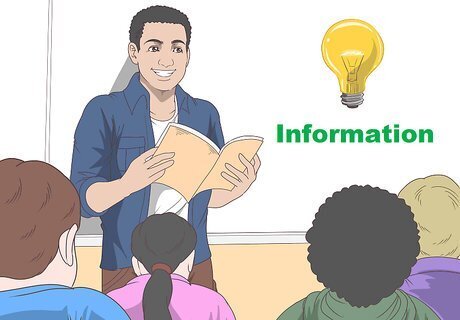
Read with class guidelines in mind. If you are reading for a class, guide yourself by reading for information that is relevant to the class. Focus on what you need to learn from your reading and pay less attention to the rest of it to best comprehend the material. To get a sense of the class guidelines, look over the syllabus or outline for the class and pay attention to what the instructor emphasizes in class. Look over your homework assignments and quizzes to see what sorts of information from your reading that you’re normally tested on.

Use digital information to your advantage. Select keywords or phrases and use those to search within the book electronically, if possible, to find the relevant passages. This is a good way to ensure that you’ll only read useful material and won’t waste time or energy on the irrelevant parts. If you’re not able to electronically search the contents of the book, you can also look for keywords or phrases in the index and find where they are in the book that way.




















Comments
0 comment